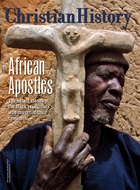The question of polygamy caused trouble for William Wade Harris. Although he believed that monogamy is the ideal, he also felt it was not always possible in Africa. At Axim, he took further wives. This may have been, in some cases, a way of giving a social identity to women who had been professional specialists in traditional religion. But at least one of these women bore him a child. In later years he would also marry a woman from Sierra Leone.
Not surprisingly, the missionaries working in the Ivory Coast were uncompromisingly hostile to polygamy and questioned Harris's open stance. A leading Harris Christian, John Ahui, took their questions to Harris, who refused to condemn the practice.
Polygamy was not a straightforward issue in Africa. On that continent, as in the ancient world, those who had a large number of children were considered greatly blessed—increasing the attractiveness of polygamy if a first marriage issued in no children.
African converts who were already in a polygamous marriage faced a difficult decision. The mission churches insisted that before they could become baptized, they send away all their wives but the first. This was clearly unfair (and often a social catastrophe) to the other wives. The open stance of Harris and other indigenous leaders provided an attractive alternative.
Moreover, as African Christians studied the Bible, they quickly discovered that the Old Testament patriarchs and kings practiced polygamy. If polygamy was permitted then, they reasoned, why not now, in Africa? When discussing the issue with a white missionary, Harris himself cited the example of the much-married Solomon.
Copyright © 2003 by the author or Christianity Today/Christian History magazine.
Click here for reprint information on Christian History.

Support Our Work
Subscribe to CT for less than $4.25/month





























